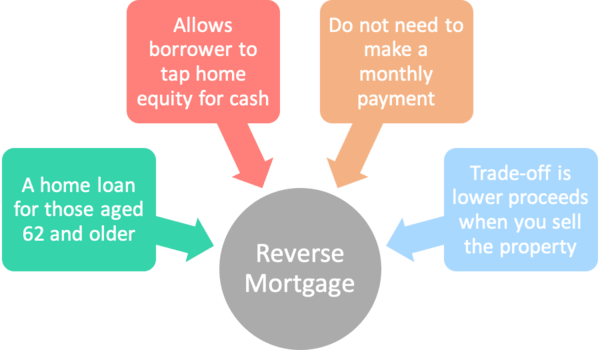Empower Your Retirement: The Smart Means to Purchase a Reverse Home Mortgage
As retirement strategies, many people look for reliable techniques to improve their economic independence and health. Among these techniques, a reverse home mortgage arises as a feasible choice for property owners aged 62 and older, allowing them to touch right into their home equity without the need of month-to-month settlements.
Understanding Reverse Home Loans
Recognizing reverse home mortgages can be crucial for house owners seeking economic versatility in retirement. A reverse home loan is a monetary item that permits eligible homeowners, normally aged 62 and older, to transform a part of their home equity into cash money. Unlike typical home mortgages, where consumers make month-to-month settlements to a loan provider, reverse mortgages enable property owners to get repayments or a round figure while retaining possession of their home.
The quantity available through a reverse home mortgage depends upon a number of variables, consisting of the house owner's age, the home's value, and current rates of interest. Notably, the finance does not have actually to be paid back till the home owner markets the home, moves out, or dies.
It is necessary for prospective consumers to recognize the effects of this monetary product, consisting of the influence on estate inheritance, tax obligation factors to consider, and recurring responsibilities related to property upkeep, tax obligations, and insurance coverage. Furthermore, counseling sessions with certified professionals are often required to make sure that consumers fully understand the terms and problems of the finance. In general, a thorough understanding of reverse mortgages can encourage property owners to make enlightened decisions regarding their financial future in retired life.
Benefits of a Reverse Home Mortgage
A reverse home loan supplies numerous compelling advantages for qualified house owners, particularly those in retirement. This monetary device permits seniors to convert a section of their home equity into money, offering essential funds without the need for monthly home mortgage settlements. The cash acquired can be utilized for various functions, such as covering clinical expenditures, making home improvements, or supplementing retirement income, therefore enhancing general monetary adaptability.
One substantial advantage of a reverse home loan is that it does not need payment till the homeowner relocates out, sells the home, or passes away - purchase reverse mortgage. This feature enables retirees to maintain their way of living and meet unexpected costs without the burden of monthly settlements. Additionally, the funds received are usually tax-free, enabling home owners to use their cash money without anxiety of tax obligation effects
Moreover, a reverse home loan can provide comfort, knowing that it can function as an economic safeguard during challenging times. Home owners additionally maintain ownership of their homes, ensuring they can continue living in an acquainted atmosphere. Eventually, a reverse home loan can be a critical monetary resource, encouraging retired people to manage their funds properly while enjoying their gold years.
The Application Refine
Browsing the application process for a reverse mortgage is an essential action for property owners considering this economic choice. The initial stage involves examining eligibility, which generally needs the home owner to be at least 62 years old, very own the residential property outright or have a reduced home mortgage equilibrium, and occupy the home as their key home.
When eligibility is verified, property owners have to undergo a therapy session with a HUD-approved counselor. This session makes sure that they completely recognize the effects of a reverse home loan, including the duties involved. purchase reverse mortgage. After completing therapy, applicants can continue to collect required paperwork, including proof of earnings, possessions, and the home's value
The following step requires sending an application to a loan provider, who will evaluate the financial and building credentials. An assessment of the home will likewise be conducted to establish its market price. If accepted, the loan provider will provide finance terms, which ought to this page be examined thoroughly.
Upon approval, the closing procedure follows, where last files are authorized, and funds are disbursed. Recognizing each phase useful link of this application procedure can significantly improve the homeowner's self-confidence and decision-making pertaining to reverse mortgages.

Secret Factors To Consider Before Investing In
Getting a reverse mortgage is a substantial economic decision that calls for cautious consideration of several vital variables. Understanding your qualification is vital. House owners need to go to the very least 62 years old, and the home must be their primary home. Examining your economic requirements and goals is similarly important; establish whether a reverse home mortgage lines up with your long-lasting strategies.

In addition, assess the influence on your existing lifestyle. A reverse home mortgage can influence your qualification for sure government advantages, such as Medicaid. Lastly, look for specialist support. Consulting with a monetary expert or a real estate counselor can supply useful understandings customized to your individual circumstances. By extensively examining these factors to consider, you can make a more educated choice about whether a reverse home mortgage is the right financial method for your retirement.
Maximizing Your Funds
Once you have protected a reverse home mortgage, effectively managing the funds comes to be a concern. The flexibility of a reverse mortgage permits home owners to use the funds in numerous ways, yet calculated planning is necessary to optimize their advantages.
One crucial technique is to develop a budget that outlines your month-to-month expenses and economic goals. By identifying necessary costs such as health care, residential property tax obligations, and home maintenance, you can assign funds appropriately to guarantee long-lasting sustainability. Furthermore, take into consideration using a section of the funds for investments that can create earnings content or value in time, such as dividend-paying stocks or shared funds.
One more essential facet is to maintain a reserve. Alloting a book from your reverse home mortgage can help cover unforeseen prices, giving satisfaction and economic security. Seek advice from with a monetary expert to explore feasible tax obligation implications and how to integrate reverse home mortgage funds right into your total retired life technique.
Eventually, prudent management of reverse home loan funds can enhance your monetary protection, enabling you to appreciate your retirement years without the tension of financial uncertainty. Mindful preparation and informed decision-making will make certain that your funds work successfully for you.
Conclusion
Finally, a reverse home loan provides a practical economic strategy for seniors seeking to enhance their retired life experience. By transforming home equity into available funds, individuals can resolve necessary expenditures and secure added funds without incurring month-to-month settlements. However, mindful consideration of the connected terms and effects is crucial to take full advantage of advantages. Eventually, leveraging this financial tool can promote better independence and enhance general lifestyle throughout retirement years.
Understanding reverse mortgages can be critical for home owners looking for economic flexibility in retired life. A reverse home mortgage is a financial item that enables qualified property owners, commonly aged 62 and older, to convert a part of their home equity right into cash money. Unlike typical home mortgages, where debtors make regular monthly repayments to a lender, reverse home loans allow home owners to receive repayments or a lump sum while preserving possession of their residential property.
Generally, a thorough understanding of reverse home mortgages can equip house owners to make educated choices regarding their financial future in retirement.
Consult with an economic expert to explore possible tax ramifications and how to incorporate reverse home loan funds into your general retired life strategy.